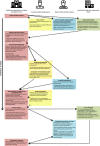Epistemic Injustice in Incident Investigations: A Qualitative Study
- PMID: 35639265
- PMCID: PMC9741561
- DOI: 10.1007/s10728-022-00447-3
Epistemic Injustice in Incident Investigations: A Qualitative Study
Abstract
Serious incident investigations-often conducted by means of Root Cause Analysis methodologies-are increasingly seen as platforms to learn from multiple perspectives and experiences: professionals, patients and their families alike. Underlying this principle of inclusiveness is the idea that healthcare staff and service users hold unique and valuable knowledge that can inform learning, as well as the notion that learning is a social process that involves people actively reflecting on shared knowledge. Despite initiatives to facilitate inclusiveness, research shows that embracing and learning from diverse perspectives is difficult. Using the concept of 'epistemic injustice', pointing at practices of someone's knowledge being unjustly disqualified or devalued, we analyze the way incident investigations are organized and executed with the aim to understand why it is difficult to embrace and learn from the multiple perspectives voiced in incident investigations. We draw from 73 semi-structured interviews with healthcare leaders, managers, healthcare professionals, incident investigators and inspectors, document analyses and ethnographic observations. Our analysis identified several structures in the incident investigation process, that can promote or hinder an actor's epistemic contribution in the process of incident investigations. Rather than repeat calls to 'involve more' and 'listen better', we encourage policy makers to be mindful of and address the structures that can cause epistemic injustice. This can improve the outcome of incident investigations and can help to do justice to the lived experiences of the involved actors in the aftermath of a serious incident.
Keywords: Epistemic injustice; Incident investigations/Root Cause Analysis; Incident reporting systems; Patient and family involvement; Professional involvement.
© 2022. The Author(s).
Figures

Similar articles
-
Questions regarding 'epistemic injustice' in knowledge-intensive policymaking: Two examples from Dutch health insurance policy.Soc Sci Med. 2020 Jan;245:112674. doi: 10.1016/j.socscimed.2019.112674. Epub 2019 Nov 9. Soc Sci Med. 2020. PMID: 31756627
-
Epistemic struggles: The role of advocacy in promoting epistemic justice and rights in mental health.Soc Sci Med. 2018 Dec;219:36-44. doi: 10.1016/j.socscimed.2018.10.003. Epub 2018 Oct 10. Soc Sci Med. 2018. PMID: 30359905
-
Involvement in serious incident investigations: a qualitative documentary analysis of NHS trust policies in England.BMC Health Serv Res. 2024 Oct 9;24(1):1207. doi: 10.1186/s12913-024-11626-4. BMC Health Serv Res. 2024. PMID: 39385114 Free PMC article.
-
Mapping out epistemic justice in the clinical space: using narrative techniques to affirm patients as knowers.Philos Ethics Humanit Med. 2021 Oct 26;16(1):9. doi: 10.1186/s13010-021-00110-0. Philos Ethics Humanit Med. 2021. PMID: 34696799 Free PMC article. Review.
-
Unravelling epistemic injustice in medical education: The case of the underperforming learner.Med Educ. 2024 Nov;58(11):1286-1295. doi: 10.1111/medu.15410. Epub 2024 Apr 27. Med Educ. 2024. PMID: 38676450 Review.
Cited by
-
Humanizing processes after harm part 1: patient safety incident investigations, litigation and the experiences of those affected.Front Health Serv. 2025 Jan 3;4:1473256. doi: 10.3389/frhs.2024.1473256. eCollection 2024. Front Health Serv. 2025. PMID: 39831148 Free PMC article.
-
The value of experts by experience in social domain supervision in the Netherlands: results from a 'mystery guests' project.BMC Health Serv Res. 2024 Feb 9;24(1):187. doi: 10.1186/s12913-024-10692-y. BMC Health Serv Res. 2024. PMID: 38336792 Free PMC article.
-
Promoting Patient Safety Through Patient Engagement at the Organisational Level: A Delphi-Based Needs Assessment Among Patient and Family Advisory Councils.Health Expect. 2025 Jun;28(3):e70319. doi: 10.1111/hex.70319. Health Expect. 2025. PMID: 40492414 Free PMC article.
-
Role of the regulator in enabling a just culture: a qualitative study in mental health and hospital care.BMJ Open. 2022 Jul 27;12(7):e061321. doi: 10.1136/bmjopen-2022-061321. BMJ Open. 2022. PMID: 35896289 Free PMC article.
-
External inspection approaches and involvement of stakeholders' views in inspection following serious incidents - a qualitative mixed methods study from the perspectives of regulatory inspectors.BMC Health Serv Res. 2024 Mar 6;24(1):300. doi: 10.1186/s12913-024-10714-9. BMC Health Serv Res. 2024. PMID: 38448964 Free PMC article.
References
-
- Anderson E. Epistemic justice as a virtue of social institutions. Social Epistemology. 2012;26(2):163–173. doi: 10.1080/02691728.2011.652211. - DOI
MeSH terms
LinkOut - more resources
Full Text Sources
Medical

